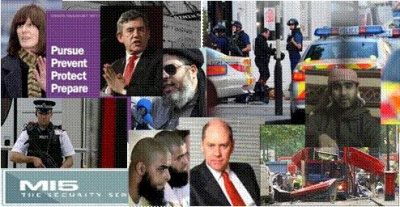Difference between revisions of "Counter-Terrorism Portal"
m (minor tightening tweaks) |
m (minor tighten) |
||
| Line 57: | Line 57: | ||
In the 1970s, when the Troubles spilled onto the British mainland, the UK enacted counterterrorism measures, such as [[Internment]], [[the Northern Ireland (Emergency Provisions) Act (1973-96)]] and the [[Prevention of Terrorism (Temporary Provisions) Act (1974-2000)]]. | In the 1970s, when the Troubles spilled onto the British mainland, the UK enacted counterterrorism measures, such as [[Internment]], [[the Northern Ireland (Emergency Provisions) Act (1973-96)]] and the [[Prevention of Terrorism (Temporary Provisions) Act (1974-2000)]]. | ||
| − | After various failed attempts at bringing peace, | + | After various failed attempts at bringing peace, [[the Good Friday Agreement]] was finally signed in April 1998 and ended the Troubles. The current threat from Irish paramilitary organisations is limited to a small number of Republican splinter groups, such as the [[Real Irish Republican Army]] [[(RIRA)]]. |
| − | When the Prevention of Terrorism Act expired in 2000, according to [[Clive Walker]] – “its replacement became an acute issue”. <ref>[http://www.law.leeds.ac.uk/about/staff/walker.php Clive Walker (2002) Blackstones Guide to the Anti-Terrorism Legislation [Oxford: Oxford University Press, p. 2]</ref> As a consequence, it was replaced by a permanent act – The[[Terrorism Act 2000]], which became the “bedrock” of the anti-terror legislation for the UK.<ref>[http://www.amazon.co.uk/British-War-Terrorism-Counterterorism/dp/0826499007 Steve Hewitt (2007) The British War on Terror: Terrorism and Counterterrorism on the Home Front since 9-11, Continuum International Publishing Group Ltd, p. 35] </ref> | + | When the Prevention of Terrorism Act expired in 2000, according to [[Clive Walker]] – “its replacement became an acute issue”. <ref>[http://www.law.leeds.ac.uk/about/staff/walker.php Clive Walker (2002) Blackstones Guide to the Anti-Terrorism Legislation [Oxford: Oxford University Press, p. 2]</ref> As a consequence, it was replaced by a permanent act – The [[Terrorism Act 2000]], which became the “bedrock” of the anti-terror legislation for the UK.<ref>[http://www.amazon.co.uk/British-War-Terrorism-Counterterorism/dp/0826499007 Steve Hewitt (2007) The British War on Terror: Terrorism and Counterterrorism on the Home Front since 9-11, Continuum International Publishing Group Ltd, p. 35] </ref> |
| − | In direct response to the events of 9/11, a series of other legislations | + | In direct response to the events of 9/11,the UK government also enacted a series of other legislations such as [[the Anti-Terrorism, Crime and Security Act 2001]], [[the Criminal Justice Act 2003]], the [[Prevention of Terrorism Act 2005]] , the [[Terrorism Act 2006]] and the [[Counter-Terrorism Act 2008]]. The objective behind these legislations was to ensure the UK was protected from events such as 9/11 on its territory. |
In 2003, the government initiated a four pronged counter-terrorism strategy known as [[Contest]] (2003-09). Its ultimate objective was to "reduce the risk from international terrorism, so that people could go about their daily lives freely and with confidence." <ref>[http://security.homeoffice.gov.uk/news-publications/publication-search/general/Contest-Strategy?view Countering International Terrorism: The United Kingdom's Strategy,] July 2006, [[Home Office]], p.1 - accessed: 20 October 2009</ref> After the attacks of 7 July, 2005 however, the government felt it had to do more to prevent people from turning towards terrorism and therefore, in 2009, replaced Contest with [[Contest 2]], which was similar, but more focused on [[Preventing Violent Extremism]]. At present, there are numerous community led projects and organisational initiatives focusing on [[Prevent]]. | In 2003, the government initiated a four pronged counter-terrorism strategy known as [[Contest]] (2003-09). Its ultimate objective was to "reduce the risk from international terrorism, so that people could go about their daily lives freely and with confidence." <ref>[http://security.homeoffice.gov.uk/news-publications/publication-search/general/Contest-Strategy?view Countering International Terrorism: The United Kingdom's Strategy,] July 2006, [[Home Office]], p.1 - accessed: 20 October 2009</ref> After the attacks of 7 July, 2005 however, the government felt it had to do more to prevent people from turning towards terrorism and therefore, in 2009, replaced Contest with [[Contest 2]], which was similar, but more focused on [[Preventing Violent Extremism]]. At present, there are numerous community led projects and organisational initiatives focusing on [[Prevent]]. | ||
Revision as of 14:45, 9 November 2010
Welcome to the Counter-Terrorism Portal on Powerbase | ||||||||||||||||||||||
|---|---|---|---|---|---|---|---|---|---|---|---|---|---|---|---|---|---|---|---|---|---|---|
|
||||||||||||||||||||||

